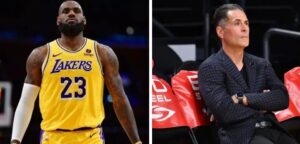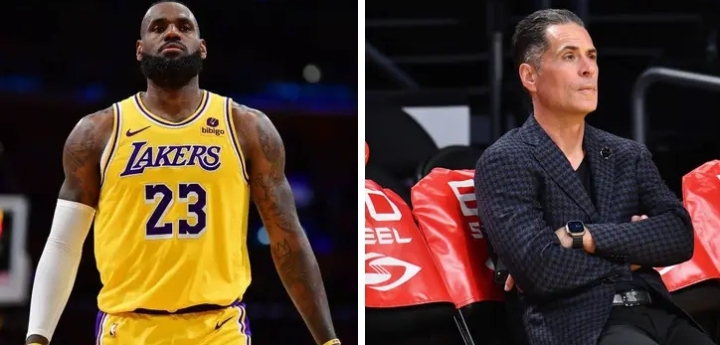Kendrick Perkins: ‘LeBron James is thinking about championships, Rob Pelinka is thinking about the future’
In a recent discussion on the state of the Los Angeles Lakers, former NBA player and current ESPN analyst Kendrick Perkins provided an insightful take on the divergent focuses within the Lakers’ organization. According to Perkins, there exists a fundamental difference in the priorities of LeBron James, the team’s star player, and Rob Pelinka, the Lakers’ General Manager.

“LeBron James is thinking about championships, while Rob Pelinka is thinking about the future of the Lakers,” Perkins stated during an episode of ESPN’s NBA Today. This remark sheds light on the balancing act that often takes place within professional sports organizations, where the immediate goals of star players might not always align with the long-term strategic plans of the management.
### The Quest for Championships
LeBron James, often referred to as one of the greatest basketball players of all time, has made it clear throughout his career that his primary focus is winning championships. Since joining the Lakers in 2018, James has been instrumental in leading the team to its 17th NBA title in 2020. His relentless pursuit of excellence and championship glory has been a defining characteristic of his illustrious career.
At 39, James knows that his window for adding more titles to his already impressive resume is narrowing. This urgency drives him to push the Lakers’ management to make moves that will immediately enhance the team’s chances of winning. Whether it’s recruiting seasoned veterans or advocating for trades that bring in top-tier talent, James’ focus remains firmly on the present and the tangible goal of securing another championship ring.
### Pelinka’s Vision for the Future
On the other side of the spectrum is Rob Pelinka, who has the challenging task of balancing LeBron’s immediate aspirations with the long-term health and success of the Lakers franchise. As the General Manager, Pelinka must consider not only the current roster but also the team’s future prospects, salary cap management, and draft strategies.
Pelinka’s approach involves building a sustainable model that ensures the Lakers remain competitive even after LeBron’s era. This means making strategic decisions that might not always align with LeBron’s desire for immediate reinforcements. For instance, investing in young talents like Austin Reaves and Rui Hachimura or securing future draft picks to build a robust pipeline of emerging stars.
### The Tension Between Present and Future
Perkins’ comment underscores a common tension in sports organizations where the goals of star players and management can sometimes seem at odds. For the Lakers, the stakes are even higher given the prominence of the franchise and the expectations that come with having a player of LeBron’s caliber.
However, this dynamic is not necessarily negative. The pressure from LeBron can serve as a catalyst for Pelinka to make bold moves that could benefit both the present and future of the team. Conversely, Pelinka’s long-term vision can ensure that the Lakers do not fall into a period of mediocrity once LeBron retires.

### Finding the Balance
The challenge for the Lakers is finding a balance where both LeBron’s championship ambitions and Pelinka’s future-oriented strategies can coexist. This might involve making calculated risks, such as acquiring experienced players who can contribute immediately while also nurturing young talent for sustained success.
In conclusion, Kendrick Perkins’ observation highlights an essential aspect of professional sports management. The delicate balance between the immediate desires of star players and the strategic foresight of management is crucial for a franchise’s sustained success. For the Lakers, navigating this balance will be key to maintaining their status as one of the premier teams in the NBA, both during and after LeBron James’ tenure.

